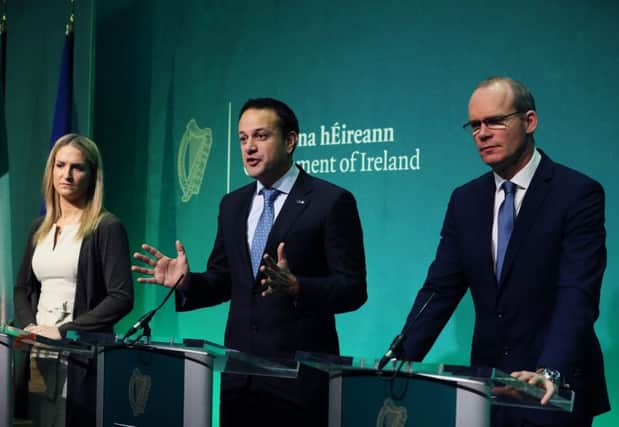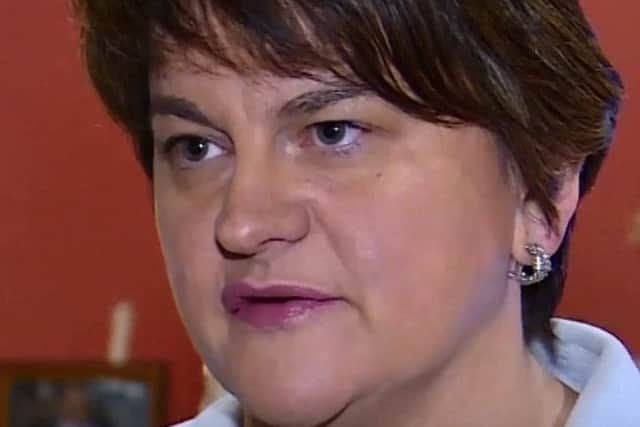DUP comfortable with Brexit text but SF '˜concerned'


On Monday the DUP maintained that the final phase one Brexit text supplied by Dublin would have, in its view, resulted in a widening gap between Great Britain and Northern Ireland in terms of EU regulations, thereby undermining the union.
However, after accusing Dublin of deliberately withholding the text until the 11th hour to try and bounce them into a deal, the DUP used the Tory Government’s dependence on it for a Commons majority to block any settlement.
Advertisement
Hide AdAdvertisement
Hide AdIt spent the following three days looking to secure a more satisfactory text. The agreement announced by the UK and EU which emerged yesterday is understood to include DUP amendments to at least four key paragraphs in the section relating to Ireland and Northern Ireland.


DUP leader Arlene Foster declared that “Northern Ireland will leave the European Union along with the rest of the United Kingdom”, adding that there will be “no customs or trade border down the Irish Sea between Northern Ireland and the rest of the United Kingdom”.
She added: “There will be no so-called ‘special status’ for Northern Ireland as demanded by Sinn Fein.”
The DUP leader continued: “Northern Ireland will not be separated constitutionally, politically, economically or regulatory from the rest of the United Kingdom, and the joint UK-EU report at the conclusion of phase one makes clear that in all circumstances the United Kingdom will continue to ensure the same unfettered access for Northern Ireland’s businesses to the whole of the UK internal market.”
Advertisement
Hide AdAdvertisement
Hide AdThe DUP leader made clear there was “still more work to be done” in particular around the alignment of rules and standards.


EU negotiator Michel Barnier said alignment would apply only to the “island of Ireland”, not the rest of the UK, the BBC reported.
However some Brexiteers have read clauses 49 and 50 as meaning the whole of the UK would have to abide by some EU rules, noting in particular that clause 50 promises “no new regulatory barriers” between Northern Ireland and the rest of the UK.
However Mrs Foster also quoted a clause from the early part of the text stating “that nothing is agreed until everything is agreed” in relation to further phases of Brexit talks.
Advertisement
Hide AdAdvertisement
Hide AdIt is expected any final text will still be subject to potential amendments before it is finally translated into legislation.
UUP leader Robin Swann said the text provides “high level” reassurances to launch negotiations around the small print in the days ahead, with up to 142 areas of cross-border co-operation still needing to be dealt with.
And Prime Minister Theresa May published an accompanying letter assuring Northern Ireland that the government “will always uphold and support Northern Ireland’s status as an integral part of the United Kingdom”.
Taoiseach Leo Varadkar said the implication of agreement was that the UK and the EU’s joint commitment to the retention of a free-flowing Irish border post-Brexit is “rock solid and cast iron” and that “we achieved what we sought to achieve”.
Advertisement
Hide AdAdvertisement
Hide AdSpeaking on BBC Talkback, however, DUP MP Jeffrey Donaldson played down the significance of the Irish government’s reaction as pre-election posturing.
Just before 9am SDLP leader Colum Eastwood issued a statement on similar lines as the taoiseach. “We welcome the guarantee that there can be no hard border in Ireland,” he said.
But while all the aforementioned political parties acknowledged that the agreement constituted only phase one of the Brexit talks and that much detail was yet to be discussed, Sinn Fein alone on the nationalist side explicitly highlighted what it saw as genuine “danger”.
While all the other parties made their public statements comparatively early on Friday morning, Sinn Fein Deputy Leader Mary Lou McDonald and the party’s Northern Ireland leader Michelle O’Neill tweeted that they were still seeking clarification.
Advertisement
Hide AdAdvertisement
Hide AdIt was not until 2.30pm that the party finally issued a formal statement. In it Gerry Adams, speaking from Dublin, gave a “cautious and qualified welcome” to the deal.
But unlike the DUP, his party had no veto over the final text with Dublin, and he acknowledged that it been the Irish government, not Sinn Fein, which had approved the text.
Mr Adams outlined a wide range of concerns, including the fact that the deal “does not address key areas of concern for many citizens, especially nationalists living in the north and citizens in the border region”.
He added: “The insistence by the British that Britain and the North must leave the customs union and the single market presents a real and live danger which cannot be understated.”
Advertisement
Hide AdAdvertisement
Hide AdThe text also threw “no light” on the future right of citizens in Northern Ireland to access the European Court of Justice, he said.
“The Irish government needs to be very conscious that the refusal to embrace rights is at the heart of the current difficulties in the political institutions and the collapse of the Executive.”
Ms O’Neill said the deal represents a degree of progress.
The Alliance Party was also positive, describing the agreement as “a foundation on which to build”.
On the unionist side only TUV leader Jim Allister voiced outright concerns.
Advertisement
Hide AdAdvertisement
Hide AdHe said: “The default position, if there is no UK/EU trade deal, is wholly prejudicial to Northern Ireland’s complete leaving of the EU,” said the former QC. “This default position, if there is no deal, leaves us entrapped within the EU’s single market and customs union on an unspecified, but clearly extensive, range of issues, whereas the rest of the UK would be liberated from such.”
l See more of DUP’s statement on page 10
l Morning View, page 10